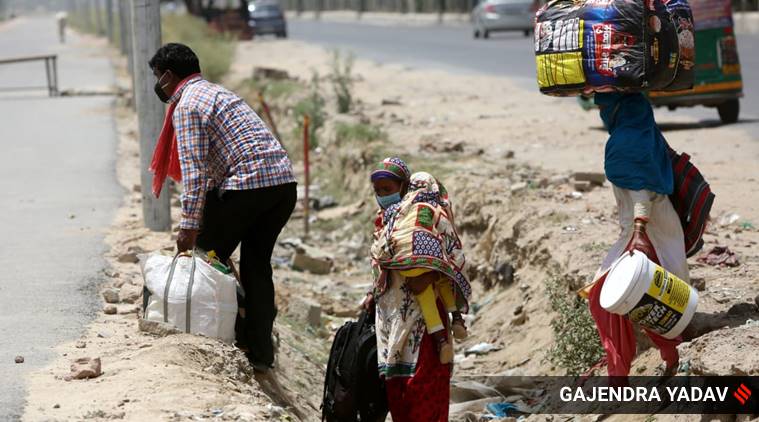
The Indian Express
Migrants don’t have to pay to go home, ensure they get food on the way: SC
The bench of Justices Ashok Bhushan, S K Kaul and M R Shah, which took suo motu cognizance of the issue on Tuesday, saying it had also received several letters and representations from different sections of society, and directed that states share the bus or train fare of the stranded migrants returning home.
by Ananthakrishnan GQuestioning the Centre and states on the plight of stranded migrant workers, the Supreme Court Thursday directed that no fare be charged from them for their journey home, and that arrangements be made to provide them with food.
The bench of Justices Ashok Bhushan, S K Kaul and M R Shah, which took suo motu cognizance of the issue on Tuesday, saying it had also received several letters and representations from different sections of society, and directed that states share the bus or train fare of the stranded migrants returning home.
An earlier bench had declined to entertain a PIL highlighting problems of stranded migrants.
Granting more time to the Centre and states to submit detailed responses, the bench ordered that the stranded migrant workers be provided food by the states concerned at places to be publicised and notified for the period they have to wait for their turn to start the journey.
While the state from where they set out shall provide meal and water at the bus station, the Railways should provide it during the journey, it said.
During the hearing, Justice Kaul asked Solicitor General Tushar Mehta: “What is the estimated time required to shift migrants? What arrangements are being made? What is the mechanism in place? Do they know if they will be shifted on fifth day, seventh day or tenth day?… What’s being done to ensure they are given information?”
Mehta said since the states are the boarding points, they would be able to explain this better.
“But what is the normal time? If a migrant is identified, there must be some certainty that he will be shifted out within one week or ten days at most? What is that time?” the bench asked.
In its order later, the bench directed states to “simplify and speed up the process of registration of migrant workers and also provide help desk for registration at the places where they are stranded”.
It said states must “try to endeavour that after registration, the workers should be asked to board the train or bus at the earliest and complete information should be publicized to all concerned regarding mode of transport”.
“We further direct that those migrant workers who are found walking on the highways or roads shall be immediately taken care by the concerned State/Union Territories and they shall be provided transport to the destination and all facilities including food and water be provided to those found walking on the road,” the bench said.
On earlier occasions, the court had refused to intervene in the matter of migrant workers who had begun walking home. On March 31, the Solicitor General had told the court that as of 11 am that day, no migrant labourer was walking on foot to reach home.
Earlier this month, the court declined to entertain a PIL seeking directions to District Magistrates to immediately identify moving or stranded migrant labourers, shift then to labour camps and provide them food and “free transport” to their villages.
A different bench of the court had, on that occasion, wondered how it could stop migrants from walking and that it was up to the states to act.
But the bench on Thursday made it clear that it would take a comprehensive view of the issue and directed that all necessary details regarding the number of migrant workers, the plan to transport them etc be brought on record.
It also asked the Railways to provide trains as and when the state governments put in requests.
Earlier, Mehta thanked the court for taking cognisance of the matter and said some isolated incidents have taken place and these are being shown repeatedly.
He said he has filed a preliminary report in response to the notice issued by the court. He said the initial lockdown had a two-fold purpose — to break the chain of the virus and to enhance and strengthen hospitals and healthcare.
Justice Bhushan said: “We are not disputing the fact that Centre has not taken steps. But whoever needs help is not getting that help.”
Mehta said that thought initially there was movement of migrants, it was sought to be stopped so that infection does not move from urban to rural areas. But subsequently, the Centre, he said, decided to shift the migrants.
He said the government will not stop its efforts until every single migrant is shifted. He referred to the Railways plying Shramik special trains and said that due to some unfortunate incidents, what actually happened had not been placed in the public domain.
He said 3700 special trains were operated between May 1 and 27 to transport migrants, and 91 lakh migrants (50 lakh by train and 41 lakh via the road transport) had already been shifted.
Mehta said the Centre and all state governments were “working fully in cooperation across party lines” to deal with the issue. Some problems, he said, keep arising but movement of migrants is done in coordination with the originating state, receiving state and the Railway ministry.